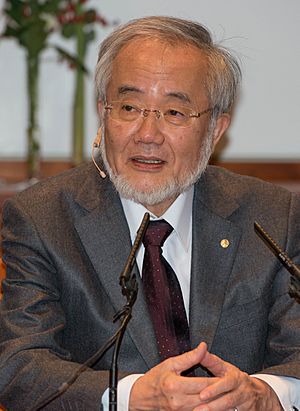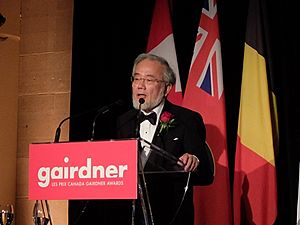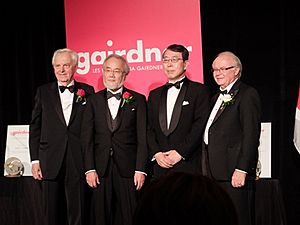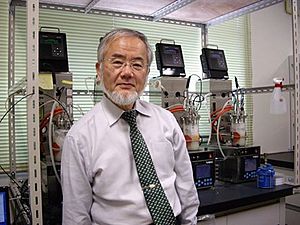Yoshinori Ohsumi facts for kids
Quick facts for kids
Yoshinori Ohsumi
|
|
|---|---|

Ohsumi in 2016
|
|
| Born | February 9, 1945 Fukuoka, Japan
|
| Alma mater | University of Tokyo (BSc, DSc) |
| Known for | Autophagy |
| Awards | Kyoto Prize (2012) Gairdner Foundation International Award (2015) Nobel Prize in Physiology or Medicine (2016) Breakthrough Prize in Life Sciences (2017) |
| Scientific career | |
| Fields | Cell biologist |
| Institutions | Institute of Science Tokyo Tokyo Institute of Technology |
Yoshinori Ohsumi (大隅 良典, Ōsumi Yoshinori, born February 9, 1945) is a Japanese cell biologist specializing in autophagy, the process that cells use to destroy and recycle cellular components. Ohsumi is a professor at Institute of Science Tokyo's Institute of Innovative Research. He received the Kyoto Prize for Basic Sciences in 2012, the 2016 Nobel Prize in Physiology or Medicine, and the 2017 Breakthrough Prize in Life Sciences for his discoveries of mechanisms for autophagy.
Biography

Ohsumi was born on February 9, 1945, in Fukuoka. He received a B.Sci. in 1967 and a D.Sci. in 1974, both from the University of Tokyo. In 1974–77 he was a postdoctoral fellow at the Rockefeller University in New York City.
He returned to the University of Tokyo in 1977 as a research associate; he was appointed Lecturer there in 1986, and promoted to Associate Professor in 1988. In 1996, he moved to the National Institute for Basic Biology, Japan in Okazaki City, where he was appointed as a professor. From 2004 to 2009, he was also professor at the Graduate University for Advanced Studies in Hayama. In 2009, he transitioned to a three-way appointment as an emeritus professor at the National Institute for Basic Biology and at the Graduate University for Advanced Studies, and a professorship at the Advanced Research Organization, Integrated Research Institute, Tokyo Institute of Technology (Tokyo Tech). After his retirement in 2014, he continued to serve as Professor at Institute of Innovative Research, Tokyo Institute of Technology. Currently, he is head of the Cell Biology Research Unit, Institute of Innovative Research, Tokyo Institute of Technology.
Christian de Duve coined the term autophagy in 1963 whereas Ohsumi began his work in 1988. Prior to that time, less than 20 papers per year were published on this subject. During the 1990s, Ohsumi's group described the morphology of autophagy in yeast, and performed mutational screening on yeast cells that identified essential genes for cells to be capable of autophagy.
In 2016, he was awarded the Nobel Prize in Physiology or Medicine "for his discoveries of mechanisms for autophagy". He is the 25th Japanese person to be awarded a Nobel Prize. Ohsumi's spouse Mariko, a Professor of Teikyo University of Science, collaborated on his research. She is a co-author of many academic papers with him.
Recognition
Source:
- 2005 – Fujihara Award, Fujihara Foundation of Science
- 2006 – Japan Academy Prize, Japan Academy
- 2007 – Science Award, Botanical Society of Japan
- 2008 – Asahi Prize, Asahi Shimbun
- 2012 – Kyoto Prize in Basic Sciences
- 2013 – Thomson Reuters Citation Laureate
- 2015 – Gairdner Foundation International Award
- 2015 – International Prize for Biology
- 2015 – Keio Medical Science Prize
- 2015 – Person of Cultural Merit
- 2015 – Rosenstiel Award
- 2016 – Wiley Prize in Biomedical Sciences
- 2016 – Dr. Paul Janssen Award for Biomedical Research
- 2016 – Nobel Prize in Physiology or Medicine
- 2017 – Breakthrough Prize in Life Sciences
- 2017 – Honorary doctorate from Kyoto University, Japan
Selected publications
His original findings about autophagy in yeast cells:
Follow up with more research on yeast:
Others
See also
 In Spanish: Yoshinori Ohsumi para niños
In Spanish: Yoshinori Ohsumi para niños
- List of Japanese Nobel laureates
- List of Nobel laureates affiliated with the University of Tokyo



